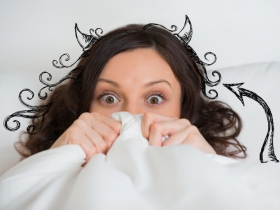The Monster Called PMS - Causes, Symptoms and Treatment
Premenstrual syndrome (PMS) affects many women. Appearing about a week before the start of menstruation, it often accompanies the start of menstruation and can have physical and psychological manifestations. Women with premenstrual syndrome complain of lower abdominal pain, cramps, headaches or poor skin condition. Other symptoms include irritability, poor concentration, stress, fatigue and general depression. Although premenstrual syndrome is not classified as a disease and is often a source of a variety of indiscriminate comments, according to studies, almost 80% of women suffer from PMS. For some of them, it is so strong that it limits them in everyday life. What are its causes, symptoms and how it can be treated?
What is the cause of PMS?
The most important factor that causes women to experience premenstrual syndrome is hormone levels. The female body goes through several stages during the menstrual cycle. If the egg is not fertilised during ovulation, the body begins to prepare for its elimination from the body. This process is associated with a decrease in oestrogen levels and, conversely, an increase in progesterone levels. Some women also have higher prolactin production or a decrease in serotonin, which is notoriously known as the happy hormone. Every woman experiences the fourth phase of the menstrual cycle (so-called luteal) differently. Some have no symptoms and for some it is a very demanding time of the month. Common symptoms of PMS are:
- bloating and a bloated abdomen
- worsening of the skin and a higher incidence of pimples and acne
- water retention and swelling
- sharp mood swing
- less tolerance for oneself and others
- irritability, outbursts of anger and crying
- lowered libido and desire for sex
- total energy loss
- abdominal pain, headache, sore breasts and cramps

How to alleviate the symptoms of PMS?
Because premenstrual syndrome is not diagnosed as a disease, modern medicine has no specific treatment for it. In addition, the situation is complicated by the fact that every woman experiences the days before menstruation differently. Some have no problems at all and others suffer greatly. Therefore, each case must be assessed individually. Every woman knows her body well and, according to certain signals, knows what awaits her. If you know that the days before menstruation are difficult for you, you have pain and you do not feel in your skin, you can prepare for it.
No matter what anyone thinks of PMS, every woman knows how she feels, it's her own body and she should manage this herself accordingly. For the period when PMS arrives, it pays not to plan any major sporting performances or heavy physical activity. As much as possible, avoid stress, conflict and postpone important business meetings or issues in your personal life for a few days later. Relaxation activities such as yoga, stretching, light exercise or walking can help alleviate the symptoms.
A good lifestyle and a balanced diet also play an important role. Feelings of bloating and swelling can be solved to some extent by an increased fluid intake and adherence to a drinking regime. It will also help to consume smaller portions of food at more frequent intervals. A woman with symptoms of PMS should eat foods with less salt and a higher fibre content. While salt retains water in the body, fibre aids digestion. This is much easier said than done, because many women have an irresistible craving for sweet or fried food in the days before menstruation.
Do everything for your well-being
Premenstrual syndrome also has an increased risk of yeast infections and other unpleasant problems in the intimate areas. Hormonal imbalances during this time leads to a disturbance of the natural environment, microflora and pH in the vagina. This can then lead to a feeling of dryness, burning or itching. Preparations with lactobacilli and other beneficial substances are commonly available to help alleviate these discomforts. It is also recommended during PMS to limit the consumption of sugary drinks and foods, as sugars create an ideal environment for yeast.
Herbs are also a powerful aid. First in line is Lady's Mantle, which is recommended for the treatment of all women's ailments. It is especially beneficial as a prevention against pain and irritation. If you suffer from bloating, it is advisable to reach for a decoction of cumin or fennel. St. John's wort is suitable for digestion, which relieves stress and anxiety and acts against stomach and intestinal problems. The Peruvian watercress (Maca) is for general health and wellbeing. Women suffering from symptoms of premenstrual syndrome should also increase their intake of magnesium, zinc and antioxidants, which are naturally found in some foods or can be bought as a dietary supplement, during this time.
If a woman's PMS restricts her to the point that her daily life is difficult and none of the above-mentioned advice helps, it is time to visit a gynaecologist. They will determine if there are any other issues behind the symptoms and will recommend appropriate treatment. Usually, very painful premenstrual syndrome can be treated with hormonal contraceptives or appropriate pain medications. Another alternative is the administration of corpus luteum and progestogens before the expected PMS period. In really serious cases, women can also take diuretics, which help to remove fluids from the body. However, all these methods must be consulted with a gynaecologist, who will recommend the most appropriate treatment.





